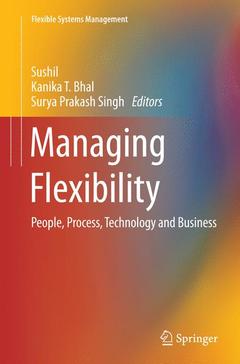Description
Managing Flexibility, Softcover reprint of the original 1st ed. 2016
People, Process, Technology and Business
Flexible Systems Management Series
Coordinators: Sushil , Bhal Kanika T., Singh Surya Prakash
Language: English
Subjects for Managing Flexibility:
Publication date: 10-2016
Support: Print on demand
Publication date: 07-2015
335 p. · 15.5x23.5 cm · Hardback
Description
/li>Contents
/li>Biography
/li>Comment
/li>
Sushil is Abdulaziz Alsagar chair professor (professor of strategic, flexible systems and technology management), and Chair, Strategic Management Group at the Department of Management Studies, Indian Institute of Technology (IIT) Delhi. He has served as visiting professor and delivered seminars in many leading universities; some representative ones are University of Minnesota, Minneapolis, MN, Stevens Institute of Technology, NJ, University of Lethbridge, Alberta, Université Paris 1 Panthéon-Sorbonne, Paris, among others. He is an active researcher and supervised more than 60 doctoral dissertations. He has 20 books to his credit in the areas of flexibility, strategy, systems thinking, and technology management. He has over 300 papers in various refereed journals and conferences and pioneered the area of “flexible systems management”, making original contributions to the field of knowledge in the form of interpretive approaches in management. He is the founder editor-in-chief of Global Journal of Flexible Systems Management and serving on the editorial boards of leading international journals. He is the founder president of the professional body, “Global Institute of Flexible Systems Management.” Currently he is serving as an independent director on the boards of RINL and HSCC.
Kanika T. Bhal is Modi Chair Professor and Head at the Department of Management Studies at IIT Delhi. A PhD from IIT Kanpur, and a visiting fellow at Sloan School of Management (Cambridge, USA), she is an expert in behavioural sciences in general and leadership in particular. She has published several articles in national and international journals and conferences and is on the editorial boards of national and international journals. She has authored books on leadership, culture and ethics. She has conducted sponsored research on several nationally and internationally funded (with Fordham University, Bronx, USA and Wharton Business School, Philadelphia,USA) projects. Be




